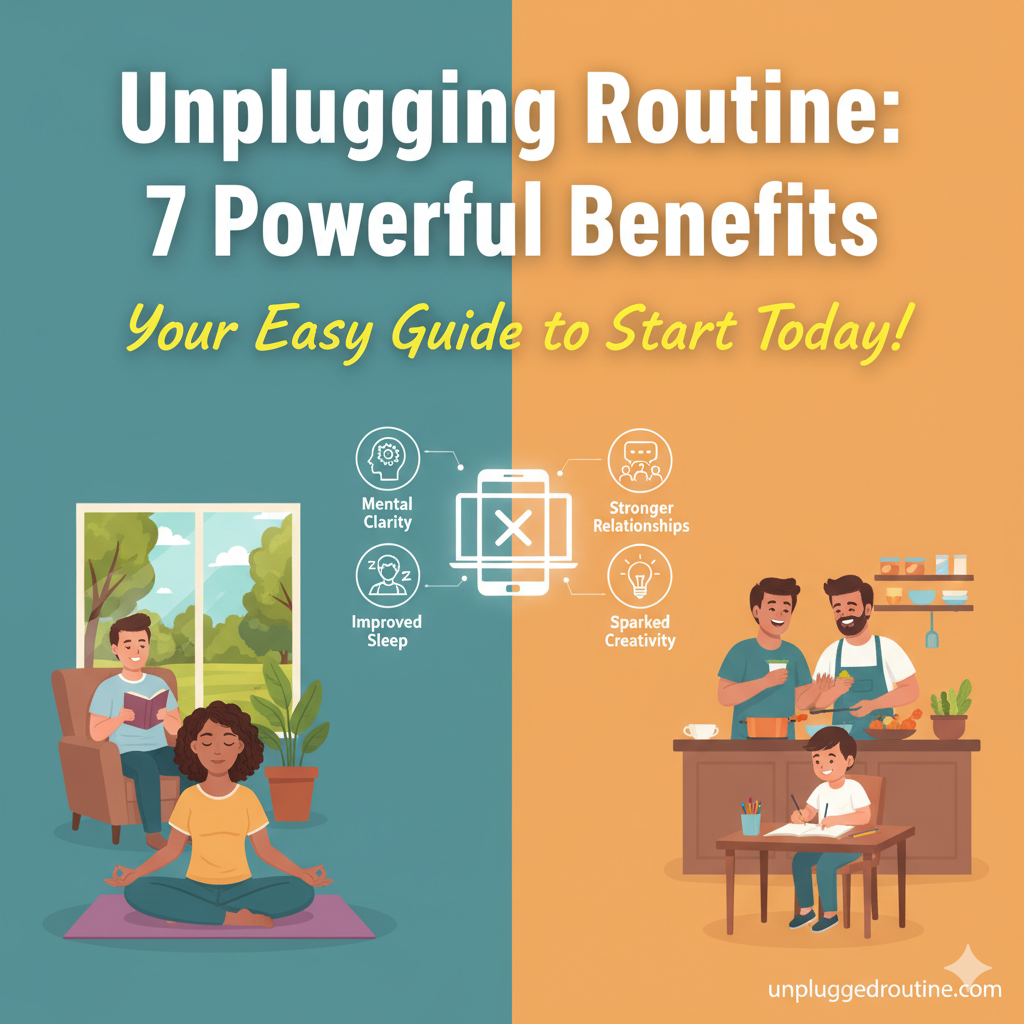In our hyper-connected world, the idea of “unplugging” often feels like a luxury, a relic from a simpler time. But what if I told you that an unplugging routine isn’t just a nice-to-have, but a vital tool for your mental health, productivity, and overall well-being? It’s not about ditching technology forever; it’s about creating intentional space away from screens to reconnect with yourself and the world around you.
Let’s dive deep into what an unplugging routine is, why it’s becoming increasingly essential, and how you can effortlessly weave it into your busy life for maximum impact.
What Exactly Is an Unplugging Routine?
At its heart, an unplugging routine is a conscious practice of stepping away from digital devices for a set period. This isn’t just about closing your laptop or putting your phone face down for a few minutes. It’s about intentionally disengaging from the constant notifications, endless scrolling, and digital demands that dominate so much of our waking hours.
Think of it as a digital detox, but instead of a one-off event, it’s a regular, sustainable habit. It could be an hour before bed, a dedicated screen-free Sunday, or even just 15 minutes of device-free quiet time each morning. The key is consistency and intentionality. It’s about reclaiming your attention and directing it towards activities that truly nourish you.
Why You Desperately Need an Unplugging Routine Now More Than Ever
Our modern lives are synonymous with digital immersion. From the moment we wake up (often to check our phones) until we go to sleep (after one last scroll), we’re bombarded. While technology offers incredible conveniences, its overuse comes with a steep price.
Constant connectivity can lead to increased stress, anxiety, sleep disturbances, and a pervasive feeling of being “on call” 24/7. An unplugging routine acts as an essential antidote, providing much-needed breaks for your mind and body to reset and recharge.
The 7 Powerful Benefits of Embracing an Unplugging Routine
Ready to transform your well-being? Here are the game-changing benefits you’ll experience when you commit to an unplugging routine:
1. Boosted Mental Clarity & Focus
Imagine a mind that isn’t constantly buzzing with notifications or fragmented thoughts from endless tabs. When you unplug, you give your brain a break from information overload. This allows for clearer thinking, improved concentration, and enhanced problem-solving abilities. You’ll find it easier to focus on tasks without the allure of digital distractions.
2. Reduced Stress & Anxiety Levels
The pressure to be constantly available, to respond instantly, and to keep up with online trends can be incredibly stressful. An unplugging routine provides a sanctuary from this pressure cooker. It lowers cortisol levels, calms your nervous system, and reduces the “fear of missing out” (FOMO), leading to a more peaceful and relaxed state of mind.
3. Improved Sleep Quality
Blue light emitted from screens, especially in the evening, disrupts your body’s natural production of melatonin, the hormone that regulates sleep. Sticking to a strict unplugging routine before bed can significantly improve your ability to fall asleep faster and enjoy deeper, more restorative sleep. Wake up feeling refreshed, not groggy!
4. Stronger Relationships & Real-World Connections
How often do you find yourself on your phone while with friends, family, or even during a meal? Unplugging forces you to be present. It encourages genuine conversations, active listening, and deeper connections with the people who matter most. You’ll be amazed at how much richer your interactions become when screens aren’t competing for attention.
5. Sparked Creativity & Deeper Self-Reflection
When your mind isn’t busy processing digital input, it has space to wander, wonder, and create. Unplugging allows for introspection, daydreaming, and the emergence of new ideas. Many artists, writers, and innovators swear by regular digital breaks to fuel their creative flow and gain fresh perspectives.
6. Enhanced Productivity & Efficiency
It might seem counterintuitive, but taking breaks from technology can actually make you more productive. Instead of getting caught in endless digital rabbit holes, an unplugging routine helps you define boundaries, prioritize tasks, and approach your work with renewed energy and focus when you are “plugged in.”
7. Greater Appreciation for the Present Moment
In a world obsessed with capturing and sharing every moment online, we often miss the actual experience. An unplugging routine brings you back to the now. It helps you notice the small joys, appreciate your surroundings, and fully immerse yourself in whatever you are doing, be it reading a book, walking in nature, or simply enjoying a cup of coffee.

How to Start Your Unplugging Routine Today (No Extreme Measures Required!)
Starting an unplugging routine doesn’t mean throwing your phone in the ocean or living off the grid. It’s about small, manageable steps that build into sustainable habits. Here’s your step-by-step guide:
Step 1: Identify Your “Why”
Before you even think about putting your phone down, understand why you want to unplug. Is it better sleep? Less stress? More time for hobbies? Clarity on your motivation will be your strongest ally when temptation strikes.
Step 2: Choose Your Unplugging Zone & Time
Start small. Pick one specific time or place where you commit to being screen-free.
- Morning power-hour: No phone for the first hour after waking up.
- Dinner table rule: No devices during meals.
- Bedroom sanctuary: Phones and tablets stay out of the bedroom.
- One evening per week: Designate a “digital-free evening.”
Step 3: Replace Screen Time with Meaningful Activities
Nature abhors a vacuum, and so does your brain. Don’t just remove screens; replace them with something fulfilling.
- Read a physical book: Rediscover the joy of turning actual pages.
- Go for a walk outside: Connect with nature, even if it’s just around your block.
- Engage in a hobby: Play an instrument, draw, paint, knit, cook, garden.
- Connect with loved ones: Have a real conversation, play a board game.
- Practice mindfulness or meditation: Even 5 minutes can make a difference.
- Journal: Reflect on your thoughts and feelings.
Step 4: Set Clear Boundaries (And Stick to Them!)
This is crucial.
- Turn off notifications: For apps that aren’t essential. Consider “Do Not Disturb” mode.
- Charge devices away from your bed: This removes the temptation for late-night scrolling.
- Communicate your intentions: Let family or close friends know when you’ll be unavailable so they don’t worry.
- Use technology to your advantage: Set alarms or timers to remind you when your unplugging session begins and ends.
Step 5: Start Small, Be Consistent, & Forgive Yourself
Don’t aim for perfection; aim for progress. Your first few attempts might feel awkward or difficult, and you might slip up. That’s okay! The goal is consistency over time, not flawless execution from day one. If you accidentally pick up your phone, just gently redirect yourself back to your unplugging activity.

Step 6: Create a “Go-To” Unplugging Toolkit
Have a few non-digital options readily available to make unplugging easier.
- A comfortable reading book with a good book.
- Art supplies or craft projects.
- A journal and pen.
- A board game or deck of cards.
- Walking shoes by the door.
Common Hurdles & How to Overcome Them
Starting an unplugging routine can present a few challenges. Here’s how to navigate them:
- “But what if there’s an emergency?” For emergencies, ensure key people have an alternative contact method. You can also designate a specific person to monitor urgent communications during your unplugged time.
- “I feel bored without my phone.” This is a good thing! Boredom often sparks creativity. Lean into it and see what non-digital activities emerge.
- “Everyone else is still online.” Your journey is yours alone. Focus on your well-being, not what others are doing. Lead by example, and you might even inspire them!
- “It’s hard to break the habit.” Like any new habit, it takes time. Be patient, be persistent, and celebrate small victories.
Reclaim Your Peace with an Unplugging Routine
In a world that constantly vies for your attention, an unplugging routine is your secret weapon for reclaiming peace, clarity, and genuine connection. It’s not about rejecting technology, but about mastering it, ensuring it serves you rather than enslaving you. By intentionally carving out screen-free time, you’re investing in your mental health, fortifying your relationships, and nurturing your inner self.
Ready to experience the transformative power of unplugging? Start small, be consistent, and watch as your life becomes richer, calmer, and more present. Visit unpluggedroutine.com today for more tips, resources, and community support to help you on your journey to a more balanced and fulfilling life!